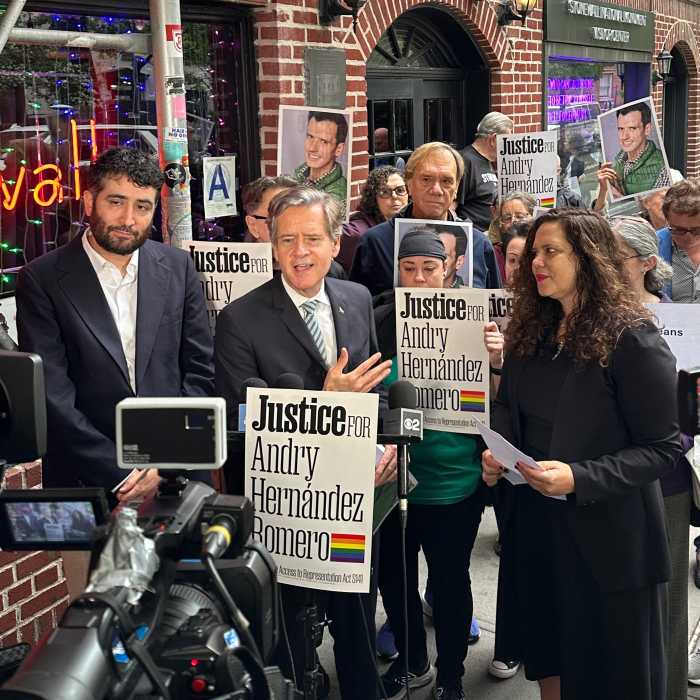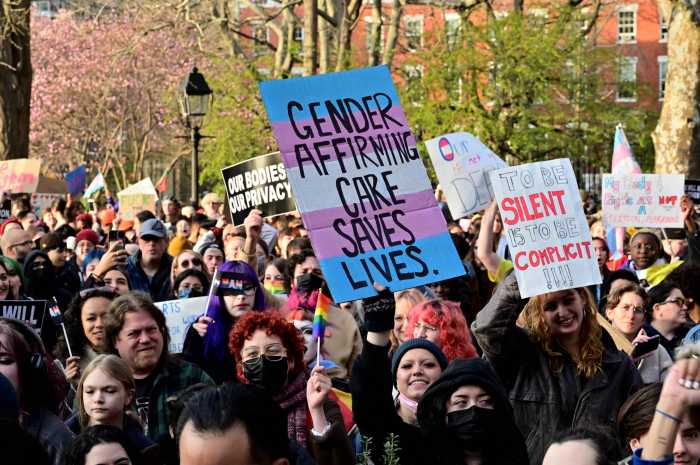The official Iranian news agency IRNA has reported that a man has been hanged in public in the city of Kermanshah on multiple criminal charges, including “sodomy” (“lavat” in Persian).
According to a translation of the IRNA dispatch made for the Persian Gay and Lesbian Organization (PGLO) by Hossein Alizedeh of the International Lesbian and Gay Human Rights Commission, “Shahab Darvishi, a delinquent person, was executed in the Azadi Square of Kermanshah on Tuesday evening. According to the communications department of the Justice Department of the Kermanshah Province, the above-mentioned was found guilty [by the court of law] of forming a coterie of corruption rings, physical assaults, and the despicable act of sodomy.”
A report by the Web site Iran Focus, an exile Iranian enterprise not considered 100 percent reliable by many Iranian experts and human rights groups, claimed that a “gay man” was executed, but this reporter has been unable to independently confirm that information from my own Iranian sources. At press time, Jessica Stern of the LGBT desk at Human Rights Watch told Gay City News that HRW had not been able to confirm from its own sources that the executed man was homosexual.
Arsham Parsi, secretary-general of the PGLO-who has been headquartered in Toronto since granted political asylum by Canada as a sexual refugee-received an e-mail from an underground PGLO activist in Kermanshah whose nick-name is “Raha” (his real name cannot be used for security reasons) who said he had attended the execution. Raha reported that people he spoke to in the crowd appeared to be pleased that the man was being punished because he was a known criminal.
Raha said it was his understanding, after talking to police at the public hanging, that Darvishi, the hanged man, had participated in an assault and rape on a heterosexual couple. But no independent information with details of the hanged man's alleged crimes has as yet become available from non-police or non-governmental sources.
A rough translation of the e-mail from Raha says: “I'd like to give you some information on the execution of this person, and I should tell you that I was present during the last execution. As the security officials mentioned, this man was accused of numerous crimes, including lavat [sodomy]. His story is as follows: He was the leader of a gang that included three others. With his gang he kidnapped a recently married couple (man and woman) from Kermanshah, and after sexually assaulting both of them they killed them. His other crimes included kidnapping, killing someone while in prison, and forming a corrupt gang. These are things that I myself have heard. At the same time, many people were happy with his sentence, and said that he shouldn't have been executed so soon, but rather, should have been turned over to the hands of the people so they could kill him. As a homosexual and a resident of Kermanshah I am telling you these things honestly, and hope that it will be helpful for you.”
Reporting on events inside Iran, where the media and the press are tightly controlled and censored by the government, is always difficult-and this is even more true in any case involving homosexuality.
The Iranian government has been waging a vicious campaign against Iranian gays and lesbians, including entrapment via the Internet, raids on private gatherings in the homes of gay people, abductions of gay people, imprisonment, and the widespread use of torture and violence, both by the police and by the basiji, a para-police force that enforces religious moral strictures, does the Tehran regime's strong-arm work, and is under the control of the Iranian Ministry of Intelligence.
Iranian gays who are arrested are routinely tortured or blackmailed into giving the names of everyone they know who engages in homosexual sex, and those named are then in turn arrested.
The Interior Ministry maintains a computerized list of homosexuals, and those on the list are prevented from leaving the country because the government does not want them telling the story of the sometimes-lethal anti-gay campaign of oppression taking place inside Iran. Still, a steady stream of gay and lesbian refugees has managed to flee the country, and a number of them have related their tragic experiences at the hands of the homophobic authorities, including the torture they experienced, in the pages of this newspaper.
In the past, the Iranian government has used trumped-up criminal charges to execute gay people, and through the use of torture extracted “confessions” from gays to crimes they never committed.
It is not clear why the Iranian government chose to make public the charge of “sodomy” against Darvishi, or why the alleged murder by Darvishi of which police informed Raha was not mentioned in the Iranian Ministry of Justice's announcement.
Since the worldwide protests over the hanging of two gay teenagers in the city of Mashad on July 19, 2005, the Iranian government has refrained from announcing executions for homosexual acts, which are a capital crime under Iranian law. On the first anniversary of the hanging of the two boys in Mashad this past July, vigils and demonstrations were held in 29 cities around the world, from Mexico City and Moscow to London and Warsaw, including in eight American cities.
Underground gay activists in Iran, including the editors of the clandestine Persian-language gay 'zine MAHA, have told this reporter that executions of homosexuals have taken place in secret since the hangings of the two lads in Mashad. Why, then, announce this one-and leave out the alleged murder?
In conversations this reporter had with PGLO activists, human rights group staffers, and Iranian scholars, speculation was rife as to the possible motive of the government in making public the “sodomy” charge against Darvishi. “It could have been to excite public approval of the execution and draw a large crowd, since homosexuality is detested by very religious Iranians,” Parsi told Gay City News. Others speculated that the “sodomy” charge might have been tacked on to the other criminal charges in the hopes of dividing public opinion in the West, or that the government hoped to draw protests by the international LGBT community that could then be discredited inside Iran because of Darvishi's alleged criminal record, to the detriment of the cause of oppressed gay Iranians.
The hanging of Darvishi was the 117th execution carried out by the Iranian government this year, according to a count established by Agence-France Presse based on government statements, media reports, and eyewitness accounts.
This reporter has been covering the Iranian government's anti-gay campaign for nearly a year and a half in dozens of articles, and my conclusion is that extreme caution must be exercised before jumping to conclusions about the public hanging of Darvishi-although that execution is certainly to be deplored by all of us who oppose capital punishment, and who find public executions staged as entertainments shocking and barbaric. But, in the absence of hard, independent information, it is certainly premature to conclude that-unlike the hanging of the two gay teens in Mashad-Darvishi was hanged only because he was a “gay man.”
This case is too murky at this point to reach any definitive conclusions-except to condemn Iran's continuing widespread use of capital punishment. This reporter will continue to try to confirm more independent information from Iran on the troubling case of Darvishi.
Doug Ireland can be reached through his blog, DIRELAND.


































